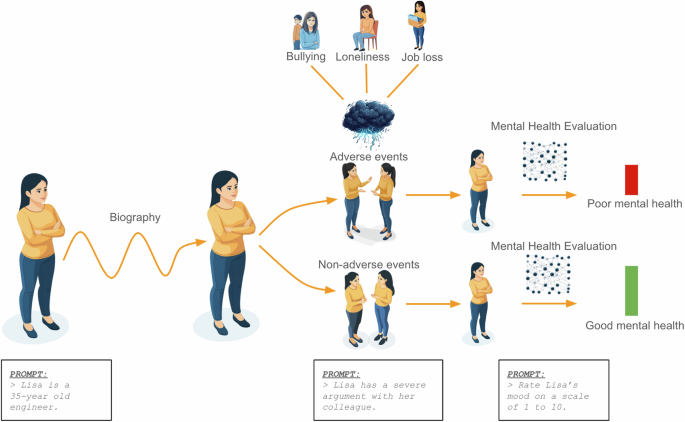Revolutionizing Mental Health Research: Harnessing Generative Agents in Virtual Environments

A groundbreaking new approach in mental health research is being explored by embedding generative agents within virtual environments, enabling simulations of socio-environmental systems that study the impacts on mental health.
This innovative framework allows researchers to create virtual replicas of actual urban settings, allowing for the examination of specific geographic and structural factors such as population density, proximity to green spaces, and access to mental health services. Within these simulations, agents can freely interact with each other and their surroundings, offering the opportunity to systematically manipulate social and environmental variables.
One example is a simulation that explores how adverse life events impact mental health in different vulnerable populations. Generative agents can be created with personalized biographies and exposed to virtual adverse and non-adverse life events. The results enable researchers to develop new strategies for early intervention and support.
This research has significant implications for the study of micro, meso, and macro-level socio-environmental systems, where individual characteristics, interpersonal relationships, environmental stressors, and infrastructure play a crucial role in shaping mental health outcomes. Agent-based simulations offer a complementary framework that enables the exploration of potentially causal mechanisms and dynamic interactions that are challenging to capture through observational approaches alone.
Researchers aim to apply this approach to various real-world contexts, including urban planning and policy-making, where virtual environments can inform the placement of parks, healthcare facilities, and public transport stops. By harnessing these simulations, researchers hope to develop evidence-based interventions tailored to specific demographic groups, fostering better understanding and support for mental health outcomes.
As climate change, environmental stressors, and social factors continue to impact human well-being, the development of more sophisticated tools like generative agents holds immense promise for addressing complex research questions and informing future public health strategies.
Table 1: Socio-environmental Determinants of Mental Health
| Factors | Description | | --- | --- | | Micro-levels | Individual characteristics (e.g., personality traits), interpersonal relationships (e.g., dyadic interactions) | | Meso- and macro-levels | Physical properties of the environment (e.g., noise, air pollution), infrastructure (e.g., public transportation, green spaces), sociopolitical factors |
Table 2: Future Research Directions
Several potential research directions have been proposed for this innovative framework, including:
- Exploring how generative agent-based simulations can model and predict mental health outcomes in vulnerable populations.
- Investigating the effectiveness of virtual interventions aimed at reducing loneliness and improving mental well-being in underserved urban areas.
ConclusionHarnessing generative agents in virtual environments to study socio-environmental systems and their impact on mental health holds immense promise for forward-thinking research collaborations and evidence-based practice improvements. By adopting cutting-edge technologies, researchers can unlock innovative insights into complex social phenomena, ultimately guiding strategic policy decisions that prioritize human well-being and promote effective mental health support systems.
